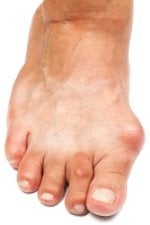 There are many reasons as to why bunions may develop. Bunions are not only a hereditary problem, but can also be caused by an imbalance of muscles in the foot or improper foot support. The bony protuberance on your foot can result from an uneven pronation, the outward rolling of your foot, or uneven supination, the inward rolling of the foot. While there is no cure for bunions other than surgery, there are many different ways for you to prevent your bunions from growing. Mensjournal.com offers guides for different stretches and exercises that strengthen your muscles and improve your balance.
There are many reasons as to why bunions may develop. Bunions are not only a hereditary problem, but can also be caused by an imbalance of muscles in the foot or improper foot support. The bony protuberance on your foot can result from an uneven pronation, the outward rolling of your foot, or uneven supination, the inward rolling of the foot. While there is no cure for bunions other than surgery, there are many different ways for you to prevent your bunions from growing. Mensjournal.com offers guides for different stretches and exercises that strengthen your muscles and improve your balance.
Bunion surgery usually occurs after non-surgical methods have proved to be ineffective. If you have any concerns about your feet or ankles, contact Dr. Jon M. Sherman of Kentlands Foot & Ankle Center . Our doctor will treat your foot and ankle needs.
What is a Bunion?
A bunion is formed of swollen tissue or an enlargement of boney growth, usually located at the base joint of the toe that connects to the foot. The swelling occurs by the bones in the big toe shifting inward, which impacts the other toes of the foot. This causes the area around the base of the big toe to become inflamed and painful.
Why do Bunions Form?
- Genetics – susceptibility to bunions are often hereditary
- Stress on the feet – poorly fitted and uncomfortable footwear that places stress on feet, such as heels, can cause bunions to form
How are Bunions Diagnosed?
Doctors often perform two tests – blood tests and x-rays – when trying to diagnose bunions, especially in the early stages of development. Blood tests help determine if the foot pain is being caused by something else, such as arthritis, while x-rays provide a clear picture of your bone structure to your doctor.
How are Bunions Treated?
- Refrain from wearing heels or similar shoes that cause discomfort
- Select wider shoes that can provide more comfort and reduce pain
- Anti-inflammatory and pain management drugs
- Orthotics or foot inserts
- Surgery
If you have any questions please feel free to contact our office located in Gaithersburg, MD . We offer the newest diagnostic and treatment technologies for all your foot and ankle needs.


